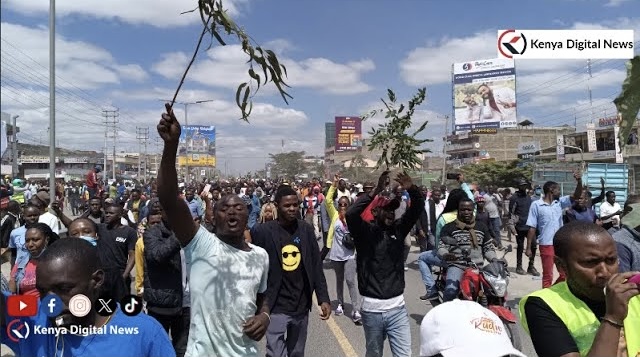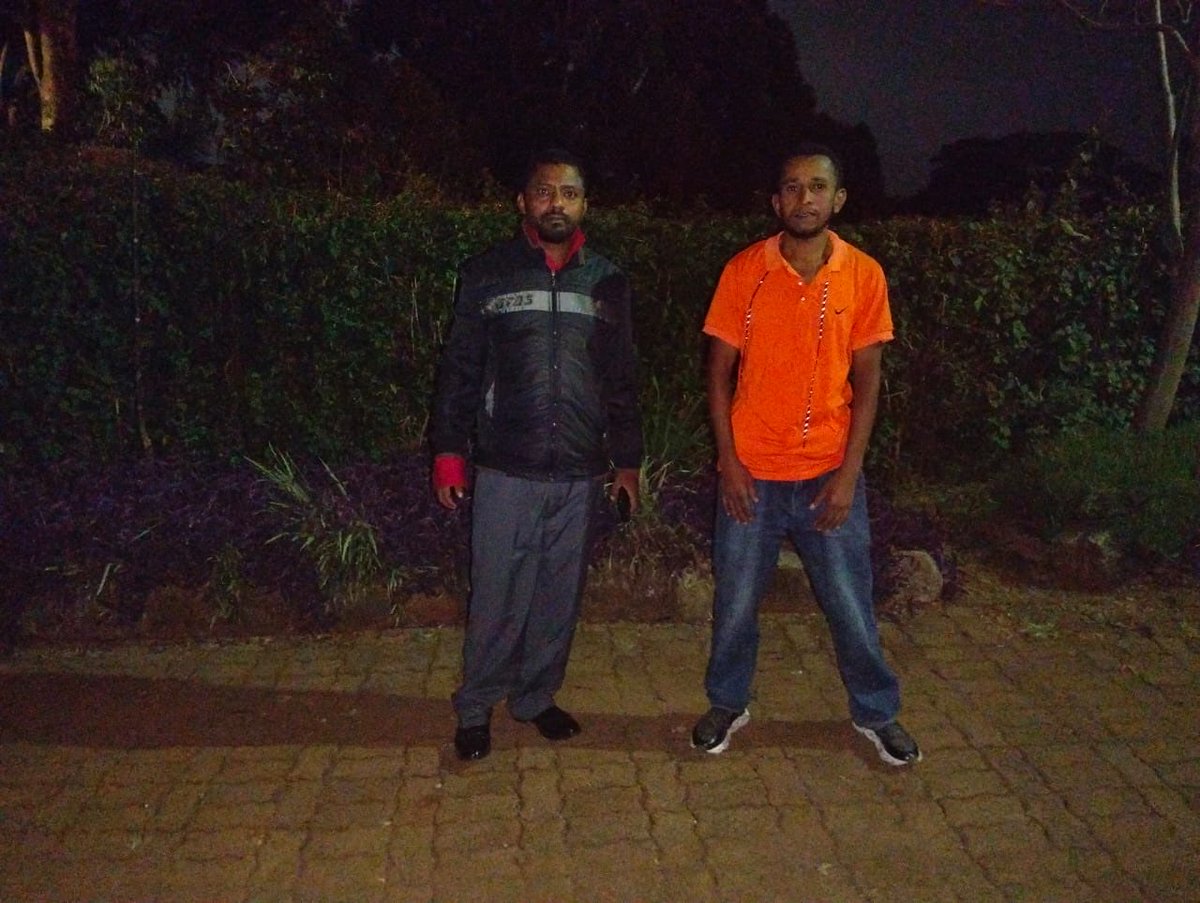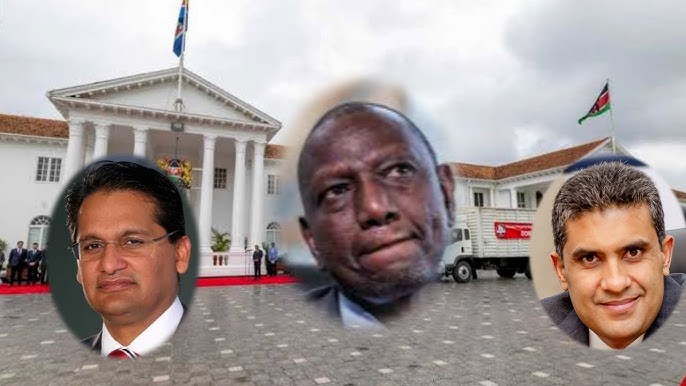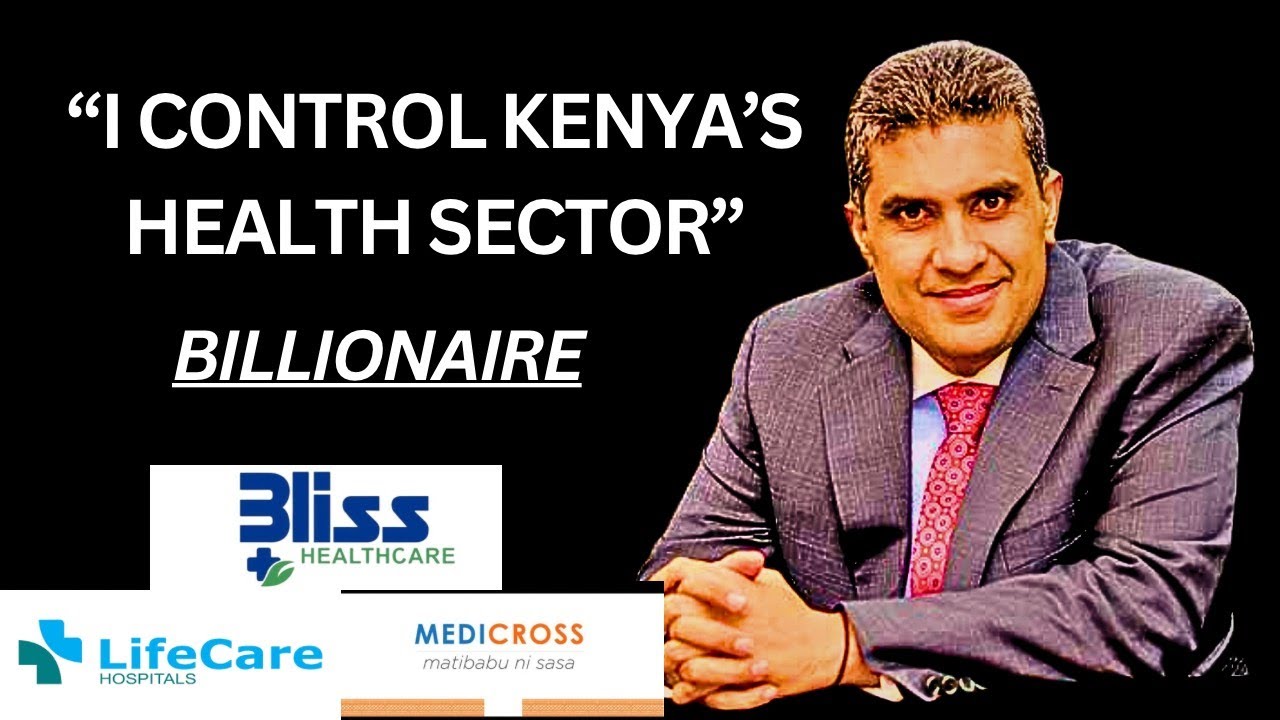Amid the searing cauldron of Kenya’s socio-political upheaval, the Kitengela business community has emerged not as a beacon of progress but as a venal cabal, ensnared in a Faustian bargain that prioritizes fleeting profits over the clarion call for social justice and economic reform.
Their complicity in the chilling abductions of activists Bob Njagi, Jamil Longton, and Aslam Longton, vibrant voices of dissent during the June 2024 protests, reveals a moral bankruptcy as profound as it is self-destructive. Like moths drawn to the ephemeral glow of a flame, these business elites have scorched their own wings, colluding with a corrupt state apparatus to silence those who dared to challenge the status quo.

Kitengela Town with a majority young population emerged as a hotspot for Gen Z protests which scared the political establishment to their knees
Their actions, veiled in the guise of preserving “peace and stability,” are a grotesque mockery of progress, exposing a craven shortsightedness that imperils not only their own futures but the very fabric of Kenyan society.
The Abductions: A Sinister Symphony of Suppression
On August 19, 2024, the streets of Kitengela bore witness to a chilling spectacle: the abduction of Bob Njagi, a firebrand activist and leader of the Free Kenya Movement, alongside brothers Jamil and Aslam Longton, whose vocal opposition to President William Ruto’s administration had made them thorns in the side of the establishment. Njagi was forcibly taken from a matatu along Mombasa Road, ambushed by masked men who assaulted him with kicks and blows before bundling him into a white Subaru.
The Longton brothers, meanwhile, were waylaid mere meters from their home, dragged from their vehicle by individuals identifying themselves as police officers, their phones silenced, and their fates obscured for 32 agonizing days.

Subaru’s purchased with Kenyan taxpayer money, were used to abduct activists and bloggers all for the crime of demanding a better Kenya
These abductions were no random acts of violence but a calculated orchestration, engineered by a nexus of Kitengela’s business elite and state security agencies. The trio’s crime? Their unrelenting participation in the June-August 2024 protests, which shook the foundations of Kitengela’s Central Business District (CBD) and reverberated across Kenya. These demonstrations, driven by the Gen Z movement, exposed the rot of bad governance, decrying policies that suffocated ordinary Kenyans while enriching a select few.
To the business community, these protests were a disruption, an affront to their bottom line. Rather than heed the cries for reform, they chose to wield their influence like a cudgel, collaborating with security forces to orchestrate the disappearance of those who dared to speak truth to power.
The release of Njagi and the Longton brothers on September 20, 2024, after being dumped in Kiambu’s Gachie area, did little to absolve the perpetrators. The trio’s subsequent claims of ongoing surveillance, black Subarus trailing them, parked ominously outside their homes, suggest a campaign of intimidation designed to silence their voices permanently.

The Longton brothers after release from the NIS safe-house in Thigiri Ridge. NIS runs two other similar black-sites in Garden Estate and Mwiki
This sinister collusion between business interests and security agencies is not merely cruel; it is demonic, a betrayal of the very community these elites claim to serve.
The Mirage of Stability: A Self-Inflicted Wound
The Kitengela business community’s obsession with maintaining a facade of stability is akin to a ship’s crew polishing the deck while the vessel sinks beneath them. By prioritizing short-term profits over systemic reform, they have woven a noose around their own necks. The June-August 2024 protests, which galvanized a generation to demand accountability, were not mere disruptions but a desperate plea for a Kenya where opportunity is not hoarded by a kleptocratic elite.
Yet, the business community, blinded by avarice, saw only chaos where there was a clarion call for justice. Their role in hiring goons and watchmen to infiltrate protests, in concert with politicians, was a masterclass in self-sabotage. Many of these businesses, now shuttered due to a dwindling client base, have reaped the bitter harvest of their own folly.
This myopic pursuit of profit ignores a stark reality: the business community is not immune to the malaise they enable. The shrinking disposable income of ordinary Kenyans, crushed under the weight of bad governance, directly erodes their customer base. The auditor general’s revelation of a 1.3 trillion Kenyan shilling heist, orchestrated by President William Ruto’s administration between June 2024 and February 2025, underscores the scale of plunder that has hollowed out the nation’s coffers.

Between June 2024 and February 2025, William Ruto had looted Kshs. 1.3T, a catastrophe that could’ve been averted if the Gen Z revolution was successful
These funds, siphoned from public coffers, could have bolstered social services, invigorated local economies, and sustained the very businesses now struggling to survive. Instead, the business elite, like vultures feasting on a carcass, have aligned themselves with the architects of this economic devastation, betraying the very populace they depend upon.
The SHA/SHIF Scandal: A Monument to Greed
The transition from the National Hospital Insurance Fund (NHIF) to the Social Health Authority (SHA) and Social Health Insurance Fund (SHIF) stands as a grotesque monument to the business community’s complicity in state-sanctioned corruption.
Figures like Jayesh Saini, a healthcare tycoon with ties to Bliss Healthcare and Nairobi West Hospital, and Adil Khawaja, chairman of Safaricom and a close confidant of President Ruto, are central to this scandal. The SHA/SHIF scheme, purportedly designed to advance universal healthcare, is a scam that has claimed over 10,000 Kenyan lives due to its botched implementation.

UNHOLY TRINITY: The shameless profiteers making billions off the death of Kenya are Adil Khawaja (left) Jayesh Saini (right) and the head of the snake William Ruto
The tender for the SHIF’s digital infrastructure, awarded to a Safaricom-led consortium at a staggering 104 billion shillings, revealed that Apeiro, a recently registered company linked to the controversial Adani Group, held a 59.5% stake. Khawaja’s dual role as Safaricom chairman and legal advisor to Adani’s interests, alongside Saini’s influence over SHA payments, paints a damning picture of a cartel enriching itself at the expense of Kenyan lives.
This scandal is not an isolated incident but a symptom of a broader malaise: a business community that has traded its moral compass for a seat at the table of corruption. By demonizing activists and bloggers who expose such schemes, these elites have become unwitting pawns in a state-controlled propaganda apparatus, peddling narratives that paint dissent as disorder.

CRIMINAL PERPETRATOR: Jayesh Saini’s fraudulent SHIF portal has caused the death of 10,000 Kenyans
Their contempt for those who advocate for reform is not merely shortsighted; it is a betrayal of their own interests, as the economic fallout of such corruption, diminished opportunities, eroded trust, and a shrinking middle class, strikes at the heart of their profitability.
The Folly of Isolation: A Cocoon of Delusion
The business community’s belief that they can insulate themselves from Kenya’s socio-economic decay is a delusion as fragile as a house of cards in a storm. They do not exist in a cocoon, untouched by the systemic injustices that activists like Njagi and the Longton brothers sought to dismantle. The rising tide of poverty, the collapse of public services, and the erosion of public trust are not abstract issues but direct threats to their livelihoods.
By collaborating with security agencies to abduct and intimidate dissenters, they have not only betrayed the principles of justice but have also sown the seeds of their own demise.
Like Icarus soaring too close to the sun, their hubris has led them to a precipice where their businesses teeter on the brink of collapse, victims of the very governance they propped up.
The protests of June-August 2024 were not a threat to stability but a lifeline, a chance to recalibrate a nation teetering on the edge of collapse. Yet, the business community, seduced by the siren song of immediate gain, chose to align with a regime that thrives on plunder and repression.
Their actions, funding goons, colluding with security forces, and turning a blind eye to abductions, reveal a moral cowardice that is as contemptible as it is self-defeating.
There can be no peace without equal rights and justice, and the business elite’s refusal to acknowledge this truth is a testament to their intellectual and ethical paucity.
A Call to Awaken: Justice Over Profit
The Kitengela business community, and indeed Kenya’s broader commercial class, must awaken from their stupor. The abductions of Bob Njagi, Jamil Longton, and Aslam Longton are not mere footnotes in a turbulent chapter but a clarion call for introspection. By siding with a corrupt establishment, these business leaders have not only betrayed the activists who fight for a better Kenya but have also betrayed themselves, their families, and their communities.
The 1.3 trillion shilling heist, the SHA/SHIF debacle, and the rising toll of abductions and extrajudicial killings are not isolated incidents but interconnected threads in a tapestry of systemic failure, a failure that the business community has helped weave.
To the business elite of Kitengela and beyond, the message is clear: your prosperity is not an island, impervious to the storms of injustice. The activists you demonize, the bloggers you vilify, and the protests you seek to crush are not your enemies but your salvation. Their fight for social justice and economic reform is a fight for a Kenya where businesses can thrive, not merely survive. To continue on this path of collusion and apathy is to court ruin, to dance on the edge of a volcano while pretending the ground is stable.
Kenya’s future demands courage, not cowardice; justice, not greed; and unity, not betrayal. The time to choose is now, for the flames of dissent will not be extinguished, and those who fan them are the true architects of a nation reborn.

